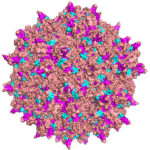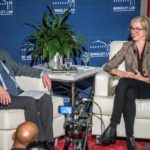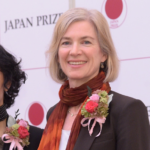For the first time, University of California, Berkeley scientists have used CRISPR-Cas9 gene editing to disable a defective gene that causes amyotrophic lateral sclerosis, or Lou Gehrig’s disease, in mice, extending their lifespan by 25 percent. The team was led by David Schaffer, faculty scientist in Molecular Biophysics and Integrated Bioimaging.
Jennifer Doudna Talks CRISPR Origins, Implications with NPR’s Joe Palca
The Director’s Distinguished Women in Science Speaker Series at Berkeley Lab kicked off on Monday, November 20, with Jennifer Doudna, a faculty scientist in the Molecular Biophysics & Integrated Bioimaging (MBIB) Division, interviewed by NPR science correspondent Joe Palca. Doudna and Palca began the conversation by highlighting a common connection: They are both graduates of Pomona College in Southern California. From there, they covered a lot of ground, providing a vivid backdrop for the answer to the most pressing question of the day: How did Doudna discover the CRISPR/Cas9 genome editing tool?
Doudna Awarded Japan Prize for Invention of CRISPR Gene Editing
Jennifer Doudna and Emmanuelle Charpentier were awarded the 2017 Japan Prize in a press conference on February 2 by the Japan Prize Foundation, in Tokyo, for their roles in the development of the CRISPR-Cas9 gene-editing system, a revolutionary tool that promises cures for many heritable diseases. The Japan Prize is awarded annually to scientists and engineers from around the world who have made significant contributions to the advancement of science and technology, thereby furthering the cause of peace and prosperity of mankind.
According to the Foundation’s press release, Doudna, faculty scientist in the Molecular Biophysics & Integrated Bioimaging Division, UC Berkeley professor of chemistry and of molecular and cell biology, and Howard Hughes Medical Institute investigator; and Charpentier of the Max Planck Institute in Berlin were honored “for deciphering the molecular details of the type II bacterial immune system CRISPR (Clustered Regularly Interspaced Short Palindromic Repeats)-Cas and the creation of the CRISPR-Cas9 genome editing system, a truly revolutionary technique in genetic engineering, far more economical and faster than those previously available.” Read more at UC Berkeley News.
CRISPR Pioneers Runners Up for Time Magazine’s Person of the Year
Jennifer Doudna, faculty scientist in the Molecular Biophysics & Integrated Bioimaging Division and molecular and cell biologist at the University of California, Berkeley, together with four other CRISPR pioneers, were among the top five named runner ups of Time Magazine’s 2016 Person of the Year. They were chosen for their roles in the development of the CRISPR-Cas9 gene-editing system, a revolutionary tool that promises cures for many heritable diseases. It is the 90th time Time Magazine has named “the person who had the greatest influence, for better or worse, on the events of the year,” the magazine states; this year, they chose Donald Trump.
Doudna shares the recognition with Emmanuelle Charpentier at the Max Planck Institute in Berlin, Feng Zhang of the Broad Institute of Harvard and MIT , Carl June at the University of Pennsylvania, and Kathy Niakan at the Francis Crick Institute in London. Read more about their pioneering work in Time Magazine’s article, The CRISPR Pioneers, their breakthrough work could change the world.
Doudna Interview: Biochemist Meets Geneticists
Faculty biochemist Jennifer Doudna recently sat down with Maria Sterrett, a Genetics Society of America (GSA) member, for the Genes to Genomes blog series, “Behind the Podium.” The UC Berkeley professor and HHMI investigator is now famous for her contribution to the development of the CRISPR/Cas9 system for genome editing and will be one of the keynote speakers at The Allied Genetics Conference (TAGC), set to take place in Orlando this July. In the interview, Doudna stressed the pivotal role played in the scientific community by societies like GSA, saying how important it is “to foster a great community of scientists to exchange ideas.” She also observed that societies encourage younger scientists to get involved in the field and introduce them to the cutting edge advances of their field. Read her interview in Genes to Genomes.
Was this page useful?







